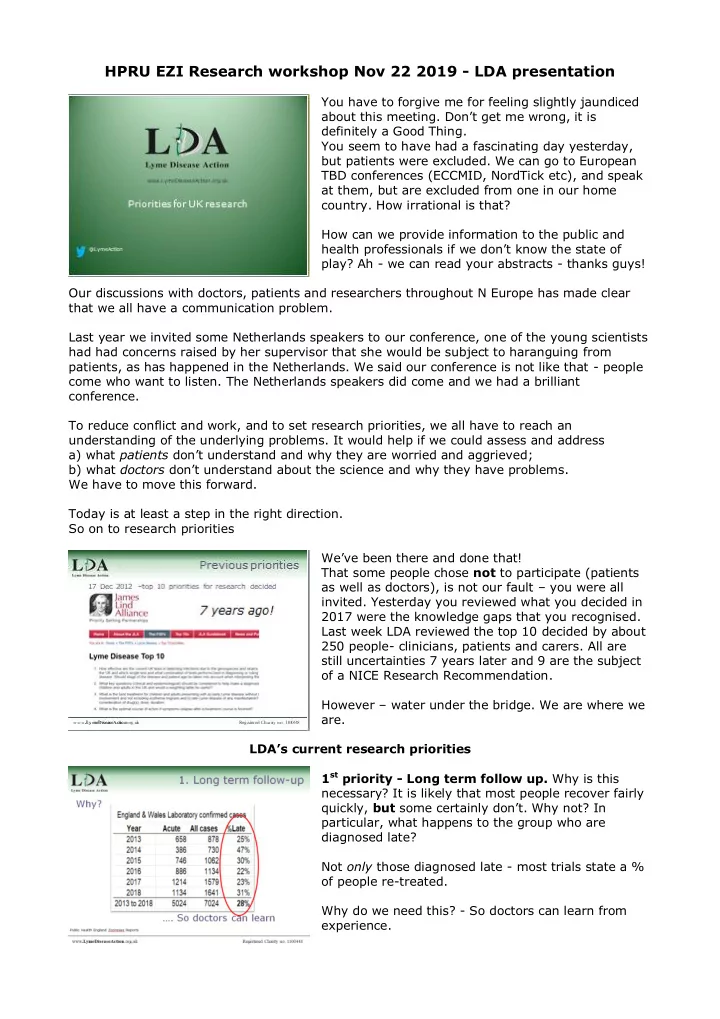

HPRU EZI Research workshop Nov 22 2019 - LDA presentation You have to forgive me for feeling slightly jaundiced about this meeting. Don’t get me wrong, it is definitely a Good Thing. You seem to have had a fascinating day yesterday, but patients were excluded. We can go to European TBD conferences (ECCMID, NordTick etc), and speak at them, but are excluded from one in our home country. How irrational is that? How can we provide information to the public and health professionals if we don’ t know the state of play? Ah - we can read your abstracts - thanks guys! Our discussions with doctors, patients and researchers throughout N Europe has made clear that we all have a communication problem. Last year we invited some Netherlands speakers to our conference, one of the young scientists had had concerns raised by her supervisor that she would be subject to haranguing from patients, as has happened in the Netherlands. We said our conference is not like that - people come who want to listen. The Netherlands speakers did come and we had a brilliant conference. To reduce conflict and work, and to set research priorities, we all have to reach an understanding of the underlying problems. It would help if we could assess and address a) what patients d on’t understand and why they are worried and aggrieved; b) what doctors don’t understand about the science and why they have problems. We have to move this forward. Today is at least a step in the right direction. So on to research priorities We’ve been there and done that! That some people chose not to participate (patients as well as doctors), is not our fault – you were all invited. Yesterday you reviewed what you decided in 2017 were the knowledge gaps that you recognised. Last week LDA reviewed the top 10 decided by about 250 people- clinicians, patients and carers. All are still uncertainties 7 years later and 9 are the subject of a NICE Research Recommendation. However – water under the bridge. We are where we are. LDA’s current research priorities 1 st priority - Long term follow up. Why is this necessary? It is likely that most people recover fairly quickly, but some certainly don’t. Why not? In particular, what happens to the group who are diagnosed late? Not only those diagnosed late - most trials state a % of people re-treated. Why do we need this? - So doctors can learn from experience.
2 nd priority - negative serology. Many of you think you know the answer to this – negative serology means Not Lyme disease. We presented a discussion paper and a list of 20 references to some infectious diseases consultants over 2 years ago. They said they would follow up, but nothing has happened: no time? not interested? know the answer? There is a fundamental difference between doctors and patients – on our subject, we do more reading, more listening, more discussing, more conference attendance. It doesn’t necessarily mean we know more of the answers, but my experience is that we know more of the true uncertainties. If you Know something - eg -ve serology=not Lyme - then you are not only not going to treat the patient, you’re also not going to investigate. 3 rd , 4 th , 5 th priorities Our remaining uncertainties are in the abstracts where you can read them. My 10 mins will run out if I go through them in detail. We do however, have some over-arching priorities. First: Involve patients Involvement doesn’t mean just asking us to collect ticks for you, to comment on a leaflet, or photographing us to prove you were in the same room as us. Of all the projects reported on yesterday, how many had patient input at the beginning? How many addressed our priorities? Second: Involve researchers – Every Guideline on Lyme disease reports that there is not enough good quality evidence. It doesn’t matter to you doctors, as you still get your grant and a publication to your name. But it matters to us patients because anyone looking for good evidence will not take your study into account . NICE, EFNS, any Guideline will say again “there was no good quality evidence…” We have been in communication with an ECDC researcher who we engaged at one of our conferences. Discussing papers on Lyme disease with her afterwards, she said : “I do not see any researcher with real experience in doing clinical research; even the clinicians involved in Lyme borreliosis research seem to be not very familiar with clinical research methodology principles.” She pointed out that a clinical methodologist is not going to initiate a Lyme borreliosis study, but will wait to be asked. So here is a challenge: ensure involvement of a clinical methodologist.
At which point my 10 mins expired, and I put up the final slide- These are our priorities-
Recommend
More recommend